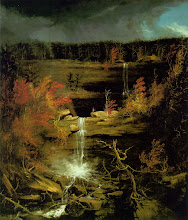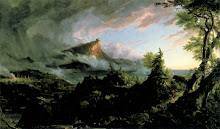In part one, Williams explains how linguistics and literary theories developed. He describes the interplay between history, language development, and linguistics. He points out how literature blossomed at the end of the feudal period as European society shifted from a society centered on religion to one with more secular concerns. From these shifts, he notes, literary theorists developed the concept of "tradition" (upholding certain ideologies) to distinguish "good" literature from "bad," thus keeping literature from becoming too egalitarian.
In part two, Williams goes on to reinterpret Marx's ideas (and post-Marxist ideas) regarding the base-superstructure. He points out the difficulties in separating art from production (with his piano example -- his one specific example!). He also rejects the idea that art is merely a reflection of society. Rather, Williams agrees with Adorno's theory that art/culture is a mediation of society -- that the mediation takes place within the art itself. He then discusses the problem of aesthetics, claiming that aesthetics is really a social function/reaction. However, he doesn't reject aesthetics because of this. He claims that artists (writers) must confront the "hegemony" within themselves (social forces) to be truly creative and to bring something "unknown" or new to the world.
Values
Marxism but reinterpreted.
Euro-centric. Asia had novels before the 17th century.
The Frankfort school highly valued.
If culture is a mediation of society, is the reverse also true?
What have these theorists got against specific examples?
Links
The aesthetic experience takes place socially? Is this like Hegel's reconciliation through art?
It's no longer the divine within, but the hegemony within. Yikes! My sense of self is either expanding or contracting. Am I a WE?
Williams reminds me a bit of Adorno in his critique of Marxist interpretations. Williams says art is not merely a reflection of society. Adorno criticizes Kant and the Freudians for their sense that art is valued not for what it is but for what it means in terms of something else.
Subscribe to:
Post Comments (Atom)
.jpg)
.jpg)
.jpg)
After a brief description of his personal background, Raymond Williams introduces his reader to four basic concepts: culture, language, literature, and ideology. Williams notes things such as the reification of base and superstructure (75). He places a great emphasis on society as shaping people: "It is not the consciousness of men that determines their being, but, on the contrary, their social being that determines their consciousness" (75). In general, the paradigm of the book includes etymology, history, and a rethinking of Marxist thought.
ReplyDeleteBecause my post has become claustrophobic to me, I have decided to place my entry here. It seems that Williams assumes that his readers are familiar with most of his references, though he does take the time to explain, clarify, or redefine certain ideas. In reference to your question, Shelia, "Am I a WE?" I think that the thinking of yourself as ONLY an I is a bourgeois notion. As Williams notes, "[The] familiar bourgeois categories in which an abstract separation and distinction between the 'individual' and the 'social' have become so habitual that they are taken as 'natural' starting points" (28). Also, in last week's blog I noted how Adorno is a lot like the character of comic book guy from the TV show The Simpsons. I think I can agree with you on your erudite connection between Williams and Adorno (in that Williams may see the sociology in art as part of the historical inquiry--"Yet to enter any part of this history, in an active way, we have to learn to understand the specific elements--conventions and notations--which are the material keys to intention and response, and, more generally, the specific elements which socially and historically determine and signify aesthetic and other situations" (157), my bawdy connection is that of Berube to comic book guy. Both Adorno and Berube would say things like, "duh, you should have known that already!" Anyway, to your question, "What have these theorists got against specific examples?" I think that method is left up to literary analysis rather than critical theory. Though Williams does make some specific examples. For instance, "the character as inert object, reduced to a set of failing physical functions, as in late Beckett" (209), displays that he does and can name some specifics at certain moments. I will agree (if this is what you are saying) that it is awkward and a little annoying how some of these writers abstain from example. Wendy Steiner, for instance, does not do this, and I think her writing is fine. While I feel a little self indulgent discussing this question, is it totally irrelevant?